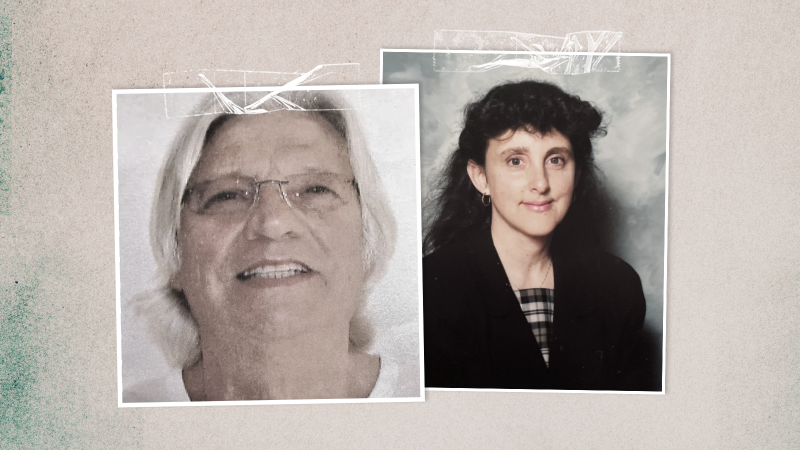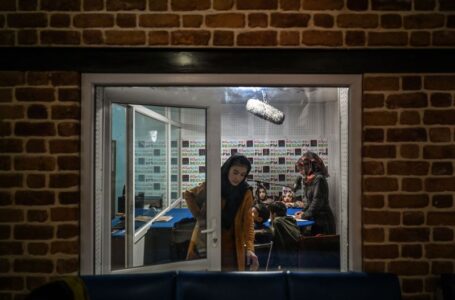MIKE POMPEO: Trump’s renewed maximum pressure on Iran will reshape the Middle East
The conman, his lovers and the mother who vanished


For more than two decades, no one listened to Sally Leydon as she begged for help to find her mother who mysteriously vanished during a trip abroad in 1997.
At the time, Australian police dismissed her concerns, insisting that her mother, Marion Barter, had disappeared by choice, and wanted nothing to do with her family.
It was a story Leydon refused to accept, and on Thursday her efforts to find her mother led to a crowded courtroom in western Sydney, where a coroner handed down her findings in an inquest spanning almost three years.
For many, the final inquest hearing offered the ultimate live update of “The Lady Vanishes,” an Australian podcast that has meticulously pieced together evidence in the case since the first episode aired in March 2019.
On Thursday morning, Leydon’s most loyal Australian supporters crammed into the courtroom, wearing green, Barter’s favorite color, as the podcast’s followers in the United States, Canada, New Zealand, Europe, the United Kingdom and beyond tuned into a live YouTube feed as Magistrate Teresa O’Sullivan delivered her findings.
“Marion Barter is deceased, and died some unknown time after October 15, 1997,” said O’Sullivan from the bench. Barter’s body has never been found.
Leydon didn’t need a coroner to confirm her mother’s death – she has long accepted that painful truth in the absence of any evidence otherwise.
But the coroner’s words confirmed what she’d suspected for years – that the early police investigation into her mother’s disappearance was botched, and that Ric Blum – a convicted conman now in his 80s, who admitted having an affair with Barter in the months before she vanished – had lied repeatedly on the stand and knew more about her mother’s disappearance than he was letting on.
A mother vanishes
In 1997, Marion Barter was ready for a change, and on June 22, she boarded a plane from Brisbane, Australia to the United Kingdom with plans for a holiday and perhaps a fresh start.
In rather dramatic fashion, the 51-year-old teacher had quit her job halfway through the school year, sold her house, and put her beloved antiques into storage on the understanding that one day she’d come home to get them, or have them shipped to her, if she settled in the UK.
As far as anyone knew, she was traveling alone.
On August 1, Barter phoned Leydon purportedly from a payphone in Tunbridge Wells in Kent, England.
Leydon, then 24 years old, told the podcast she had just finished telling her mother about the wedding dress she’d bought when the payphone ran out of credit. She never heard from her mother again.
At first Leydon didn’t dwell on the silence, but on October 18, when Barter didn’t phone her son, Leydon’s brother Owen, for his birthday, she started to worry.
One of the first calls Leydon made was to Barter’s bank to see if her mother was using her account. Regular amounts were coming out, a bank worker told her, but not from the UK.
Someone in Australia had been using her mother’s identification to withdraw 5,000 Australian dollars ($3,450.00) every day for three weeks over the counter in Byron Bay and the Gold Coast, where Barter used to live.
A shocked Leydon was sure it wasn’t her mother and reported it to the police.
Then came the response that set Leydon on a course that’s consumed most of her adult life.
Police told her that the bank confirmed that her mother had withdrawn her money and wanted nothing to do with her family.
Barter had returned to Australia, they said, and wanted to disappear.
A new life, and a new name
Years went by with little information about what happened to Barter, until an intriguing clue emerged via a police investigation that belatedly began a decade later.
Barter had changed her name in the weeks before she left and returned to Australia on August 2, 1997 – just one day after she last spoke with Leydon.
Barter’s new name was Florabella Natalia Marion Remakel, and her incoming passenger card listed her as a married resident of Luxembourg, according to the inquest.
The name “Remakel” opened new doors that led police to Blum.
In 1994, Blum placed an advertisement in an Australian-French newspaper, describing himself as a single, 47-year-old “tall, dark, sober” man, who was looking for a relationship with a view to marriage.
The ad was signed “Mr. F. Remakel,” but the phone number linked to a coin business in the New South Wales town of Ballina run by one of Blum’s many aliases.
The inquest heard Blum held at least 10 passports in different names that he used for international travel.
He told the inquest he frequently adopted new aliases for “fantasy … because it was legal.”
“I didn’t have a specific purpose,” he said.
When asked what name he was given at birth, Blum replied, “I don’t really know. But on the record of my birth … I was declared Willy Coppenolle.”
“This marks the mysterious beginning of Mr. Blum’s life,” the coroner noted in her findings.
A man of many names
Blum was born in July 1939 to unmarried parents in Tournai, Belgium, a picturesque city near the French border. He said he spent time in an orphanage before being returned to his mother and taking the name of her new husband – Wouters.
Blum arrived in Australia as Willy Wouters in 1969 but left just a year later. His next destination was France, where he was imprisoned for “fraud, forgery, confidence tricks, and giving a false identity,” the inquest heard.
After his release in 1974, he returned to Australia by boat, and in February 1976 became an Australian citizen under the name Frederick de Hedervary.
Around the same time, Blum married his fourth wife – a 19-year-old woman he met in 1969 on the boat from the United Kingdom – to whom he is still married.
Frederick and Diane de Hedervary settled into life in Australia before moving to Luxembourg, Belgium, and the UK for several years, and then returning to Australia in 1986. By then, they had two children.
In 1997, the family was living in regional New South Wales, where Blum collected a disability pension and his wife received a carer’s pension. When it was put to Blum in court that at that time “money was tight,” he agreed.
Blum told the court he began an affair with Barter in February that year, though it’s unclear how they met – it may have been through the personal advertisement that Blum placed in 1994, presenting himself as “Mr F. Remakel.”
He claimed he may have answered an ad placed by Barter, but the coroner could find no evidence of that.
Blum said their affair ended in the weeks before she went overseas in June when he told her he couldn’t see her anymore because he was married with children.
He testified the last time he saw her was three weeks before she left for the UK, when she collected tea chests she’d left at his house with a man in uniform, who he took “to be a navy officer or a pilot.”
Deceived lovers
The real Mr. F. Remakel is the ex-husband of a woman Blum once knew, Monique Cornelius, who claimed they had an affair, which Blum denies.
According to testimony read out in court in February 2022, Cornelius told police Blum was a serial liar who told her he worked as a special agent at the British Embassy in Luxembourg.
She said he wrote her a letter in 1980 professing his love for her and suggesting he would buy a boat so they could sail away together.
“I am intimately persuaded that you will not regret your decision to leave with me and to start a new life,” he wrote in the letter, which was read to the court.
Their affair ended when she found out he was married and kicked him out, Cornelius told police. Blum told the court Cornelius had lied about their relationship, which was platonic, he said.
I am intimately persuaded that you will not regret your decision to leave with me and to start a new life.”
Ric Blum’s alleged words in a letter to Monique Cornelius
Other women told the inquest of their encounters with the man now known as Blum. Some were romantic, others not. But all involved allegations of deceit.
Ginette Gaffney-Bowan told the court that she placed an advertisement in a newspaper in the late-1990s that was answered by Blum, who she knew as Frederick De Hedervary.
She said at that time, she was “extremely lonely” and working long hours in her childcare business.
Gaffney-Bowan said Blum told her he had lost his home, so she said he could stay in the studio apartment at her property in Sydney during his frequent trips to the city.
Blum: The allegations
Monique Cornelius: Met Blum in the 1980s, he wrote her a letter asking her to “start a new life” with him
Marion Barter: Had relationship with Blum in 1997, sold her house, changed her name, traveled to the UK and disappeared
Ginette Gaffney-Bowan: Met Blum in the late 1990s, alleges he wanted her to sell her house and buy an apartment in Paris, took 30,000 Australian dollars ($19,500)
Janet Oldenburg: Met Blum in the late 1990s, alleges he offered her “a new life” in the French Riviera, abandoned her in the UK, stole documents and jewelry
Ghislaine Danlois-Dubois: Met Blum in 2006, accuses him of encouraging her to sell her house and travel to Bali before disappearing with 60,000 euros ($65,000)
Andree Flamme: Met Blum in 2010, says he stayed with her before disappearing with her late husband’s coin collection
Marie Landrieu: Met Blum in 2012, alleges he proposed buying a house with her in Bali but after traveling there he disappeared with her money
Ric Blum denies all allegations, accuses the women of lying
She said their relationship wasn’t sexual, and instead he proposed a business partnership, dealing in coins. With dreams of closing her stressful childcare business, she gave him 30,000 Australian dollars ($19,500) in start-up funding. Soon after, he proposed that she sell her house so he could buy her what he called a “beautiful and spacious” apartment in Paris, she said. She refused.
Gaffney-Bowan told the court Blum belittled her and tried to drive a wedge between her and her daughters over the sale of her house. While Blum didn’t physically hurt her, she told the court he tried to blackmail her with nude photos he had taken of her. She said she became scared of him, went to the police and was granted an apprehended violence order in early 1999.
Blum told the court that Gaffney-Bowan had “dragged me into a bed” and asked him to take “salacious” photos of her, which he didn’t have developed. He denied taking her money.
Another lonely divorcee, Janet Oldenburg told the court she met Blum, who she knew as “Rick” or “Rich” in 1996 through her husband’s coin-collecting circles where they both lived in New South Wales. They reconnected in 1999 when she was 51 years old and had just finalized her divorce, she said.
Blum had offered her a job, but before she’d started, she said he urged her to move with him to the French Riviera “to start a new life.”
Blum denied ever telling Oldenburg he had feelings for her and said he had bought her a one-way ticket to Europe because she wanted to find an agent and start a new career as a belly dancer.
Oldenburg claimed that Blum abandoned her in England during their travels after inventing a story that he’d been attacked at a train station while taking a side business trip to Lille, France.
Blum admitted in court that he’d abandoned her in England because he no longer wanted anything to do with her. “My life was with my wife and kids in Australia,” he said.
He denied her claims he’d stolen jewelry and the title deeds to her house.
Several years later, Ghislaine Danlois-Dubois met Blum in 2006 through an advertisement she posted in a newspaper seeking companionship. Via video link from Brussels, she told the court she knew him as Frederick de Hedervary.
At the time, Danlois-Dubois was a 72-year-old widow looking for a distraction, and quickly fell in love with the stranger, who told her he was a bank manager from Australia with an interest in coins, she said.
Danlois-Dubois told the court that after a whirlwind romance, de Hedervary suggested they get married on the Indonesian island of Bali, and that she should sell her house and give him the proceeds so he could open bank accounts for her children, so they had ready cash when they came to visit them in Australia.
She said she refused his requests to keep their impending marriage secret from her children, and he disappeared with her money, some 60,000 euros ($65,000).
Blum denied the allegations and told the court Danlois-Dubois “didn’t give him a penny.”
Four years later, Blum crossed paths with Andree Flamme, an elderly woman he says was confined to a wheelchair, living with dementia and who “couldn’t put two words together.”
When that was put to Flamme, who gave evidence to the inquest via a live link from Portugal last year, the then 92-year-old laughed. She denied ever needing a wheelchair while he stayed with her, and, yes, she said with a smile, she could put two words together.
He left a little piece of paper to say he was leaving, and he’d be back … but I never saw him again.”
Andree Flamme, alleged victim
Flamme told the court the man she knew as Frederick de Hedervary stayed with her for several weeks in May and June 2010. While there, she said he asked to inspect her late husband’s coin collection, then disappeared with them one day when she left the house for an errand.
“He left a little piece of paper to say he was leaving, and he’d be back … but I never saw him again,” Flamme said through a translator. Blum has denied the allegations.
A sixth woman, Marie Landrieu, submitted a statement to the inquiry alleging that she’d been fooled out of cash in 2012 by a man she knew as “Willy,” who was the cousin of her late husband.
She said Blum had proposed they buy a house together in Bali, so she gave him 100,000 euros ($108,000). But after they traveled to Indonesia, he said he needed to leave on urgent business.
She never saw him – or her money – again.
Blum told the court Landrieu gave him 50,000 euros ($54,000) in cash that he considered was owed to him from an inheritance from his mother.
He denied trying to seduce her, and said they went to the tropical island because she was “interested in seeing Bali,” according to the inquest findings.
Where is Marion?
In her findings, Coroner O’Sullivan said she accepted the testimony of the women, which showed Blum had a history of mispresenting himself to single, vulnerable women for financial gain.
She found that Blum “exploited” Barter, in the same way he later exploited other women who gave evidence against him. O’Sullivan said she “did not accept as accurate anything Mr. Blum has said” in the absence of corroborating evidence.
As to Blum’s role in Barter’s disappearance, she drew attention to an “extraordinary” claim by Blum on the final day of the inquest, one he made for the first time despite hours of questioning since his first police interview in 2021.
Blum, an elderly man with a full white beard, was asked in the witness box once again if he had any information on the whereabouts of Marion Barter.
“I myself believe she is alive, that’s what I believe. But I don’t know anything about what, what she did or not, nothing. I don’t know,” he stammered.
I myself believe she is alive, that’s what I believe.”
Ric Blum
O’Sullivan interjected with a question: “Why do you believe Marion is still alive?”
“She said that she wanted to separate from her family, she didn’t want anything to do with any member of her family,” Blum said. “She was a bit of a strange person.”
The next day, Blum was recalled via video to explain why he hadn’t offered this information to police or the inquest at any time in the previous three years.
He told the court he didn’t tell police when he was interviewed in June 2021 “because they never asked.” When pushed, he said, “I had no idea of the importance of it. It was just talking. What can I say?”
O’Sullivan said in her findings, “This evidence, along with his lies and deception throughout the inquest has convinced me that he does indeed know more than he is saying.”
She found Blum formed a relationship with Barter in 1997, while posing as Fernand Remakel and “encouraged her to start a new life with him” in Luxembourg.
The coroner found Blum “persuaded or otherwise encouraged” Barter to sell her house before they left, and evidence suggested they spent some time together in England.
During the trip Barter wrote to her daughter Leydon on notepaper branded “Hotel Nikko Narita” – the same hotel Blum stayed in on his way to Europe. Barter traveled via South Korea, according to her passenger card.
The coroner found that Blum likely gave the hotel notepaper to Barter after they met in England. On her return to Australia, the coroner also found that Barter withdrew money from her accounts in August and October 1997 “on the encouragement of Mr. Blum.”
The day before Barter transferred 80,000 Australian dollars ($52,000) from her bank account, on October 15, 1997, the court heard Blum opened a safety deposit envelope, but the coroner found no evidence that he received the proceeds.
O’Sullivan found that Barter spent some months living in the community undetected, between August and October that year – and that during that time, Blum was in contact with her.
She said Blum’s claim that he last saw Barter when she retrieved the tea chests from his house with a man in uniform in June were “implausible.” And while she determined that Barter was dead, she said there was no evidence to suggest how, why or when she died.
The coroner explained that it wasn’t in her power to assign blame for Barter’s death. But she referred the matter to the NSW Police Commissioner for investigation as an unsolved homicide.
Despite submissions from Leydon’s legal team that Blum should be referred to the director of public prosecutions for alleged perjury and making false statements during the inquest, O’Sullivan said that was best left to police as part of the investigation.
The coroner was scathing in her assessment of the initial police response, which she said was “inadequate” and led to the loss of information that could have determined far earlier what happened to Barter. She also praised Leydon’s “unwavering commitment” to finding her mother.
No remains have yet been located, but Leydon’s DNA has been added to the New South Wales and national DNA registries, the coroner said.
“This means that the DNA profile of Sally [Leydon] will remain on the NSW and National DNA databases and will be searched against all unidentified deceased profiles every day,” O’Sullivan said.
O’Sullivan concluded by reading Leydon’s own words about her mother, Marion Barter, read from her submission.
“[She was] a kind, caring soul with a wicked laugh. She was intelligent, she was cultured, and she had so many friends who loved and miss her still. She would always bring you flowers or a cake. She was a very generous human.”
Blum’s believed to be living freely in northern New South Wales and has not faced any charges relating to Barter or any of the other women who gave evidence against him.
“He and his family request that all media respect their privacy,” White said.











